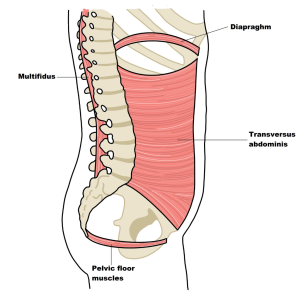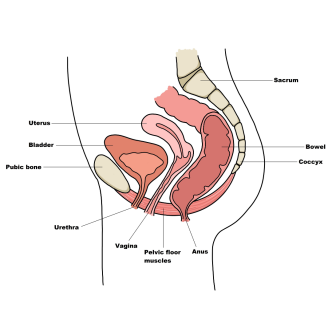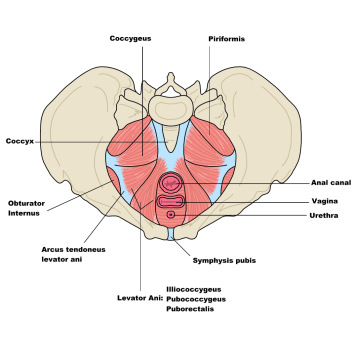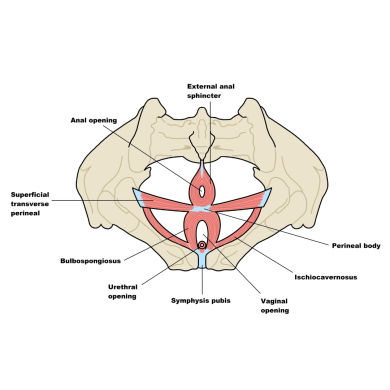Willis Street Physiotherapy's pelvic health service is delivered by trained pelvic health physiotherapist, Arantzasu Morales. Her current scope is in women's pelvic health only.
What is pelvic health and the pelvic floor?
Pelvic health is a term used to describe the optimal functioning of the pelvic region, including the bladder, bowel, reproductive organs and pelvic floor muscles (PFM).
The pelvic floor is made up of a sling of muscles, ligaments and fascia that separate the pelvic cavity from the perineal region, supporting our bladder, intestines, rectum and reproductive organs. Among their main functions are to:
|
|




What is a pelvic floor dysfunction and what conditions can be treated?
Pelvic floor dysfunction is defined as abnormal function of the PFM and includes conditions that can have significant adverse impacts on someone’s quality of life, among them we can find:
-
Urinary incontinence
-
Faecal incontinence
-
Chronic constipation
-
Pelvic organ prolapse (POP)
-
Sexual dysfunction
-
Pelvic girdle pain (PGP)
-
Chronic pain syndromes, such as recurrent lower back pain or pelvic pain.
Despite being common during pregnancy and after birth, pelvic health conditions can be present on anyone, no matter their age or reproductive status. Evidence supports as first-line of treatment conservative management with a Pelvic Health Physiotherapist.
* At this time our service does not treat anatomical male pelvic floors however we hope to provide this service in the future. *
How do I know if I might need a pelvic health assessment?
Please have a look at the Cozean Questionnaire, developed to screen for symptoms/signs of a pelvic floor dysfunction, here: Cozean Questionnaire
If I’m pregnant or postpartum, when is the best time to visit a pelvic health physiotherapist?
During pregnancy you can visit a pelvic health physiotherapist at any point. They can advise you on how to safely continue exercising, how to maintain or improve your bladder and bowel health, especially if you are experiencing any pelvic floor symptoms.
In your third trimester they can help you to prepare for labour, including breathing and flexibility exercises, as well as guidance for perineal massage.
Once your baby has come, we recommend that you come for a postnatal warrant of fitness (WOF) at 6-weeks postpartum, even if you are not certain about experiencing any symptoms of a pelvic floor dysfunction. Your pelvic health physiotherapist can examine you and guide you on your postnatal recovery, especially if you would like to return to impact activities, such as running or HIIT.
How can pelvic health physiotherapy help me?
Pelvic health physiotherapists have received specific training to assess and treat conditions where pelvic floor muscles (PFM) might play a role in, but it is much more than just the PFM.
Depending on the findings during your first assessment your physiotherapist will develop a PFM training programme specific to you, as well as a global exercise programme to suit your needs if, for example, you are suffering from incontinence, pelvic organ prolapse (POP) or Diastasis Recti Abdomini (DRAM) symptoms.
They will suggest lifestyle changes, provide toileting advice concerning your bladder and bowel, activity recommendations, self-testing and pain management strategies, if suitable. Education is one of the strongest tools of pelvic health.
What can I expect from a first session?
Pelvic health physiotherapy consists of the examination and treatment of both internal and external components of the pelvis. Your session will start with your physiotherapist asking you many questions regarding your pelvic health, medical history, activities and restrictions. As well, what are your goals and expectations, so they can create a treatment plan specific to you.
External assessment
During an external examination, we assess your joints, ligaments and muscles that are in close relationship to your pelvis. We assess your functionality and strength to identify any impairments that need to be addressed.
In terms of your pelvic region, we will observe your perineum during relaxation, contraction and Valsalva maneuver. External palpation of your perineum might be performed to assess sensitivity and/or pain, as well the condition of any scarring.
Internal assessment
Commonly during your first session an internal assessment will be performed, but this will only be undertaken with your fully informed consent. Keep in mind that this will not be performed if you are not ready/comfortable about this or there are contraindications for this assessment. These can be discussed on the day with your physiotherapist.
During an internal examination, pelvic floor muscles (PFM) are assessed for tone, elasticity, and areas of tenderness and pain. With a water-based lubricant your physiotherapist may insert one or two gloved fingers into your vagina and/or rectum to palpate your PFM from the inside. This is to properly evaluate your ability to perform voluntary contraction and relaxation of your PFM, as well assess their coordination, muscle length, strength and endurance. An assessment for pelvic organ prolapse (POP) or Levator Ani Avulsion can be performed too.
Can I still have a pelvic health session even if an internal examination cannot be performed?
Yes, you can. Internal examination is the best method to examine your pelvic floor muscles (PFM) and search for prolapse, avulsion and/or other injuries, but there are many other parts that we can assess on the day.
Keep in mind that assessing your PFM is only one part of the assessment and one part of the treatment. We will assess you for any necessary lifestyle changes, variation of your training loads or exercises. As well as symptoms arising from other parts of your pelvic region, as SIJ, lower back or hips.
How many sessions and how often will I need a follow up session?
This always depends on each patient, but following your first session you might be asked to return in a week or two. From there, your sessions are spaced out every couple of weeks or months, and at some point only once a year for a reassessment. Typically consists of 4-6 sessions, although keep in mind that some patients might only visit us one time for an assessment and self-management strategies.
What if I have been referred to pelvic health physiotherapy after surgery?
We will discuss the details of your surgery on the day of your session, but at the time of booking your appointment, please let us know in advance any relevant details to make sure we can provide the best care possible.
Is pelvic health physiotherapy covered by ACC? Do I need a referral?
You don’t need a referral to come to see a Pelvic Health Physiotherapist.
Only maternal birth injuries occurring after 1st October 2022 are currently covered by ACC. If you haven’t made a claim before with your midwife or surgeon, your Pelvic Health Physiotherapist can help you with this.
How much will my appointment cost?
Private Initial (60 mins) - $185
Private Follow Up (40 mins) - $130
ACC Initial (60 mins) - $42 * (surcharge)
ACC Follow Up (40 mins) - $35 * (surcharge)
How do I book an appointment?
You can either phone or email our friendly reception team, please ask for a pelvic health session, as there are other services at our site.
Alternatively, you can book an appointment online via the link below. Please make sure to select on the drop-down menu “pelvic health initial appointment”.
Book Online: Link here
Phone: 0800842749
Email: info@willisstreetphysiotherapy.co.nz
Resources
Do you want to know if pelvic health physiotherapy is right for you?
Click the link below to find out.



